Business Litigation Resources
In this five-part webinar series, state court judges, lawyers, and subject matter experts discuss legal and practical issues that are likely to arise in business litigation due to the COVID-19 pandemic.
- Complex Litigation Grab Bag (September 14, 2020): Webinar recording and Materials
- Business Insolvency (August 10, 2020): Webinar recording
- Employment and Labor Liability (August 3, 2020): Webinar recording
- Commercial Contract Litigation (July 20, 2020): Webinar recording and Materials
- Business Interruption Insurance Claims (July 12, 2020): Webinar recording and Materials
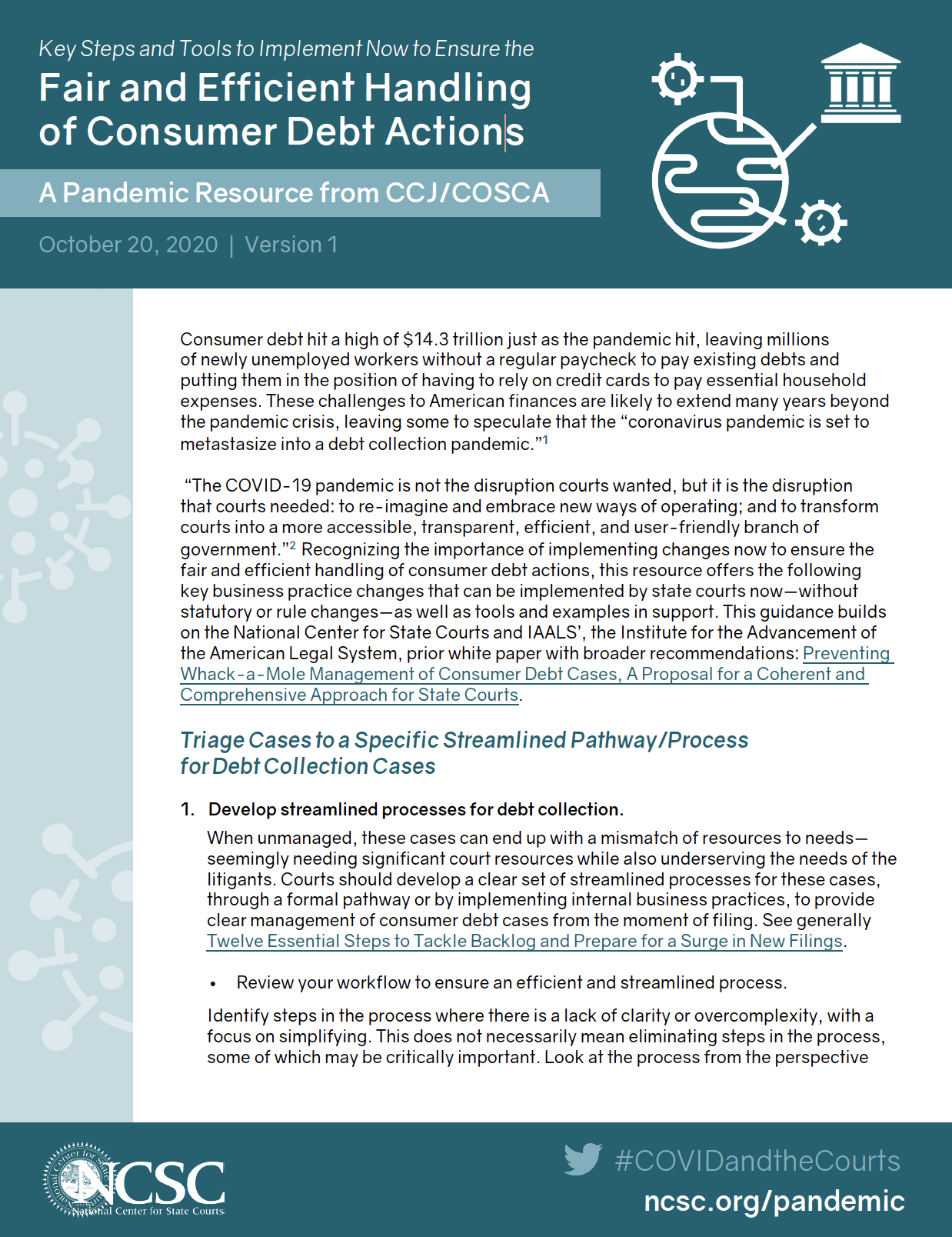 Consumer debt hit a high of $14.3 trillion just as the pandemic hit, leaving millions of newly unemployed workers without a regular paycheck to pay existing debts and putting them in the position of having to rely on credit cards to pay essential household expenses. These challenges to American finances are likely to extend many years beyond the pandemic crisis, leaving some to speculate that the “coronavirus pandemic is set to metastasize into a debt collection pandemic.” This resource offers key business practice changes that can be implemented by state courts now to ensure fair and efficient handling of consumer debt actions.
Consumer debt hit a high of $14.3 trillion just as the pandemic hit, leaving millions of newly unemployed workers without a regular paycheck to pay existing debts and putting them in the position of having to rely on credit cards to pay essential household expenses. These challenges to American finances are likely to extend many years beyond the pandemic crisis, leaving some to speculate that the “coronavirus pandemic is set to metastasize into a debt collection pandemic.” This resource offers key business practice changes that can be implemented by state courts now to ensure fair and efficient handling of consumer debt actions.
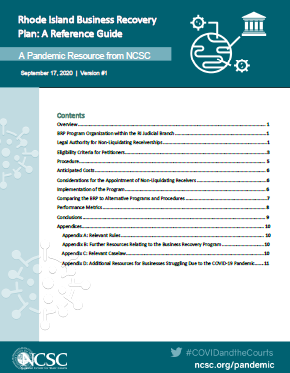 This reference guide describes the innovative “Business Recovery Plan” implemented by the Rhode Island Superior Court, Business Calendar, to provide assistance to small and medium businesses experiencing financial difficulty due to COVID-19.
This reference guide describes the innovative “Business Recovery Plan” implemented by the Rhode Island Superior Court, Business Calendar, to provide assistance to small and medium businesses experiencing financial difficulty due to COVID-19.
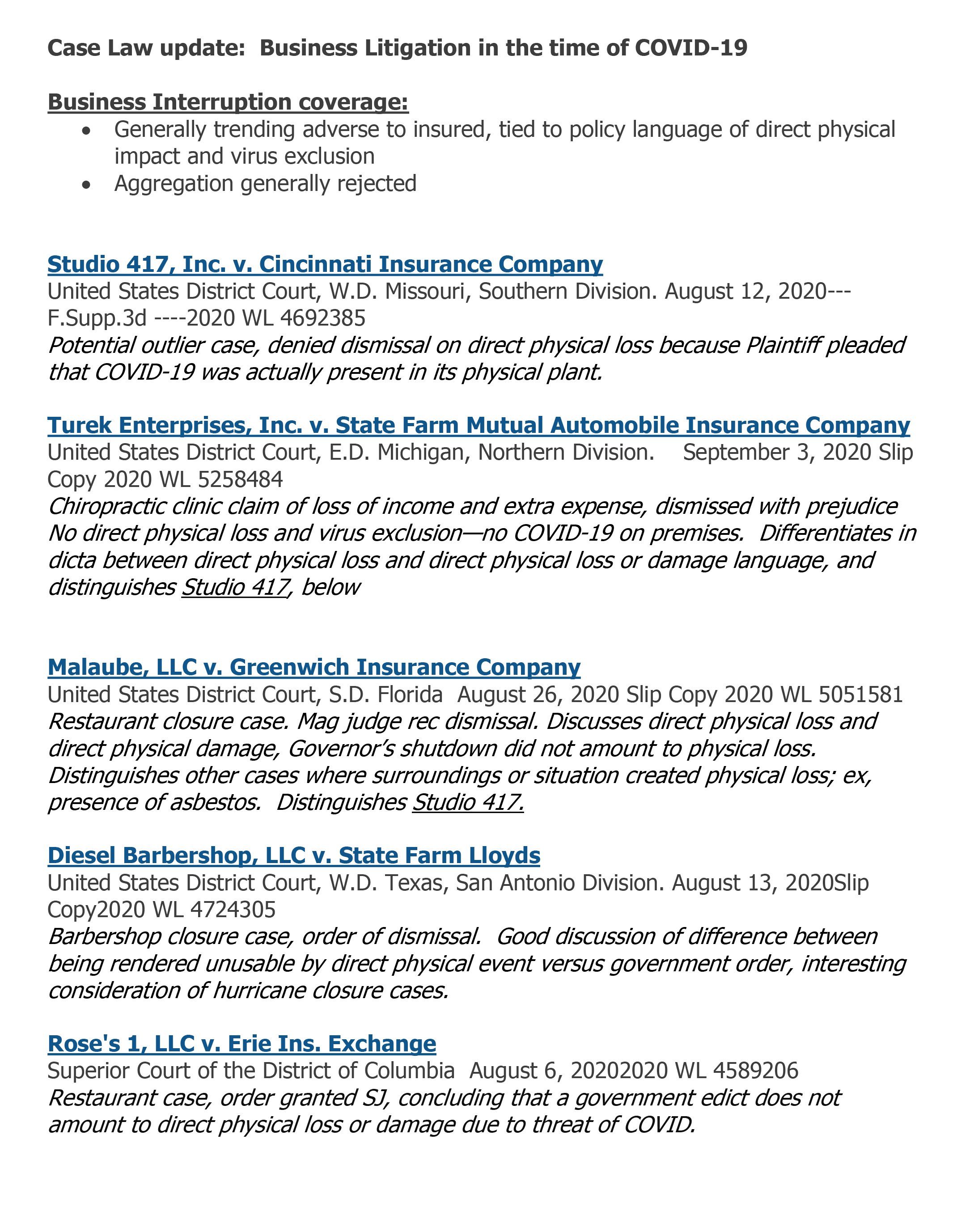 This document, developed as a resource for the September 17 business litigation webinar, includes citations and brief summaries of recent court decisions involving business interruption insurance; MDL and case aggregation for COVID-19 business cases; force majeure, including industry-specific rulings; and miscellaneous legal issues related to COVID-19.
This document, developed as a resource for the September 17 business litigation webinar, includes citations and brief summaries of recent court decisions involving business interruption insurance; MDL and case aggregation for COVID-19 business cases; force majeure, including industry-specific rulings; and miscellaneous legal issues related to COVID-19.
Resources for High-Volume Civil Dockets
Fair and Efficient Handling of Consumer Debt Actions: Key Steps and Tools to Implement NOW webinar: Consumer debt hit a high of $14.3 trillion just as the pandemic hit, leaving millions of newly unemployed workers without a regular paycheck to pay existing debts and putting them in the position of having to rely on credit cards to pay essential household expenses. These challenges to American finances are likely to extend many years beyond the pandemic crisis, leaving some to speculate that the “coronavirus pandemic is set to metastasize into a debt collection pandemic.” This webinar highlighted key steps and tools that state courts can implement now – without statutory or rule changes – to ensure that consumer debt actions are managed fairly and efficiently. Webinar materials are available here.
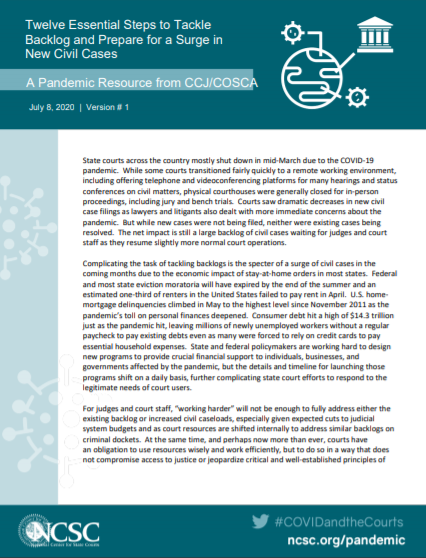 Most state courts experienced significant backlogs in civil caseloads due to the COVID-19 pandemic, and expect a substantial increase in cases, especially on high-volume calendars such as landlord/tenant, consumer debt collection, and small claims, due to the impact of stay-at-home orders on the economy. This document and related webinar offer practice case management advice for addressing backlogs and preparing for the surge in civil filings.
Most state courts experienced significant backlogs in civil caseloads due to the COVID-19 pandemic, and expect a substantial increase in cases, especially on high-volume calendars such as landlord/tenant, consumer debt collection, and small claims, due to the impact of stay-at-home orders on the economy. This document and related webinar offer practice case management advice for addressing backlogs and preparing for the surge in civil filings.
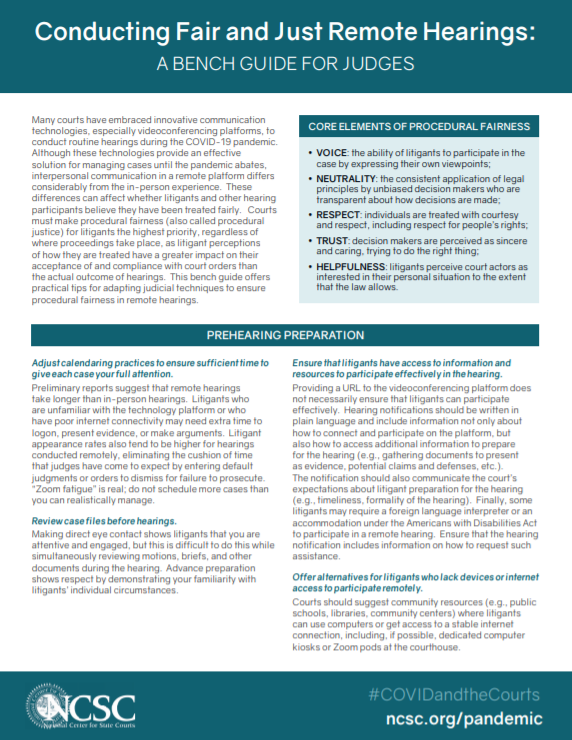 Many courts acclimated quickly to using videoconferencing platforms for court hearings. NCSC Access to Justice experts Danielle Hirsch and Zach Zarnow are joined by Paula Hannaford-Agor (NCSC) and Emily LaGratta (LaGratta Consulting) in a Tiny Chat to discuss how courts can take steps to ensure procedural fairness, especially during the pandemic. This bench guide explains the foundational tenets of procedural fairness and offers practical tips to ensure procedural fairness in remote hearings. A companion reference guide provides background research on procedural justice.
Many courts acclimated quickly to using videoconferencing platforms for court hearings. NCSC Access to Justice experts Danielle Hirsch and Zach Zarnow are joined by Paula Hannaford-Agor (NCSC) and Emily LaGratta (LaGratta Consulting) in a Tiny Chat to discuss how courts can take steps to ensure procedural fairness, especially during the pandemic. This bench guide explains the foundational tenets of procedural fairness and offers practical tips to ensure procedural fairness in remote hearings. A companion reference guide provides background research on procedural justice.
Federal and state eviction moratoria have temporarily halted eviction proceedings in many states, but state court policymakers anticipate a surge in eviction filings as these moratoria expire. To prepare, some states have implemented eviction diversion programs, many of which also tap CARES Act funds for rental assistance for tenants who have lost income due to COVID-19. This June 16, 2020 webinar highlights programs in Michigan and Pennsylvania; a follow-up webinar on September 15 returns to those programs for lessons learned about their implementation and early operations.
